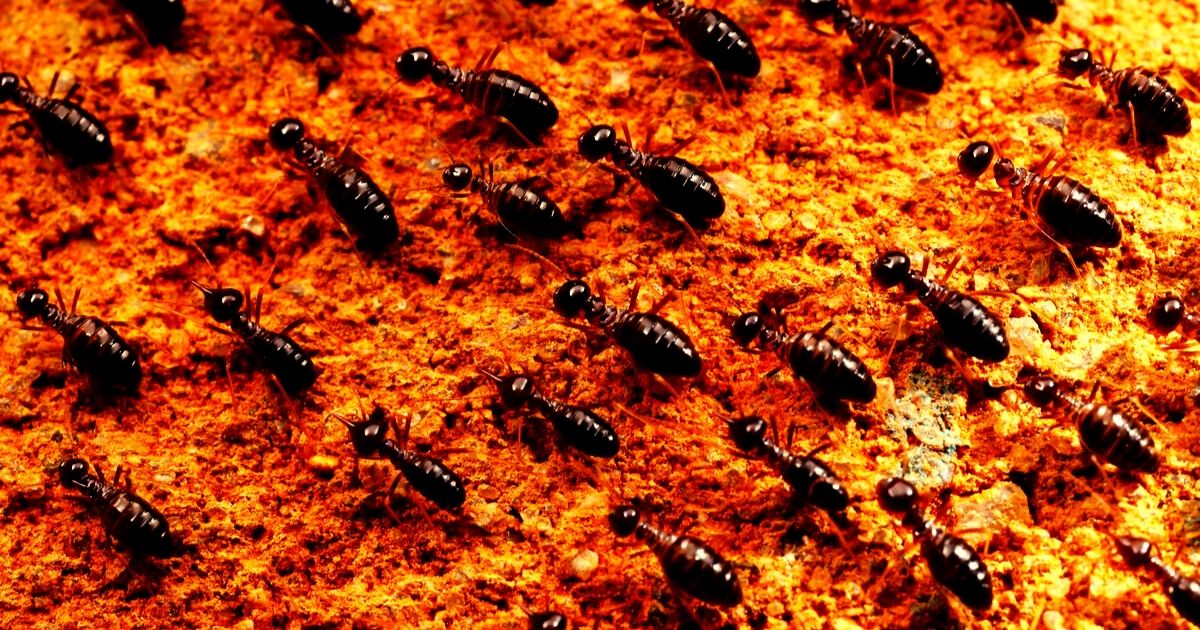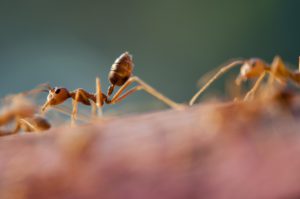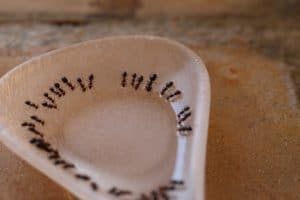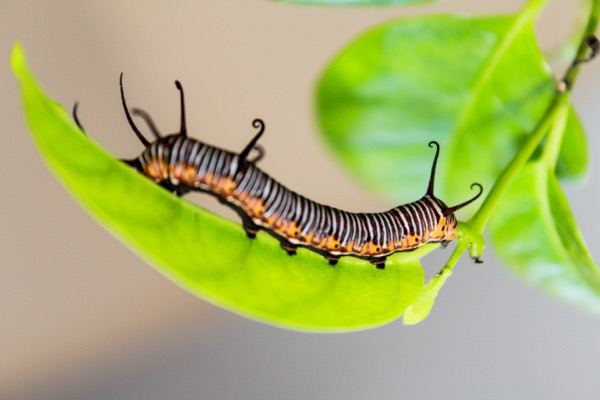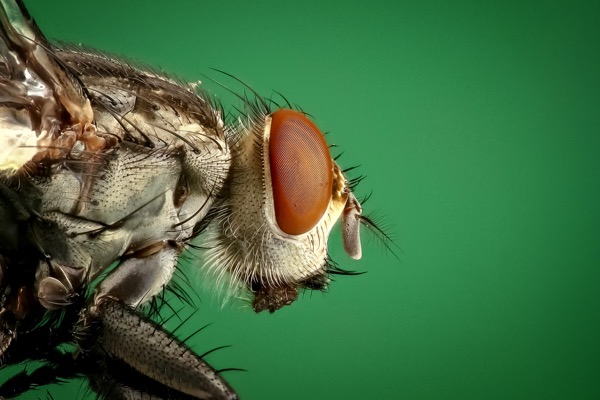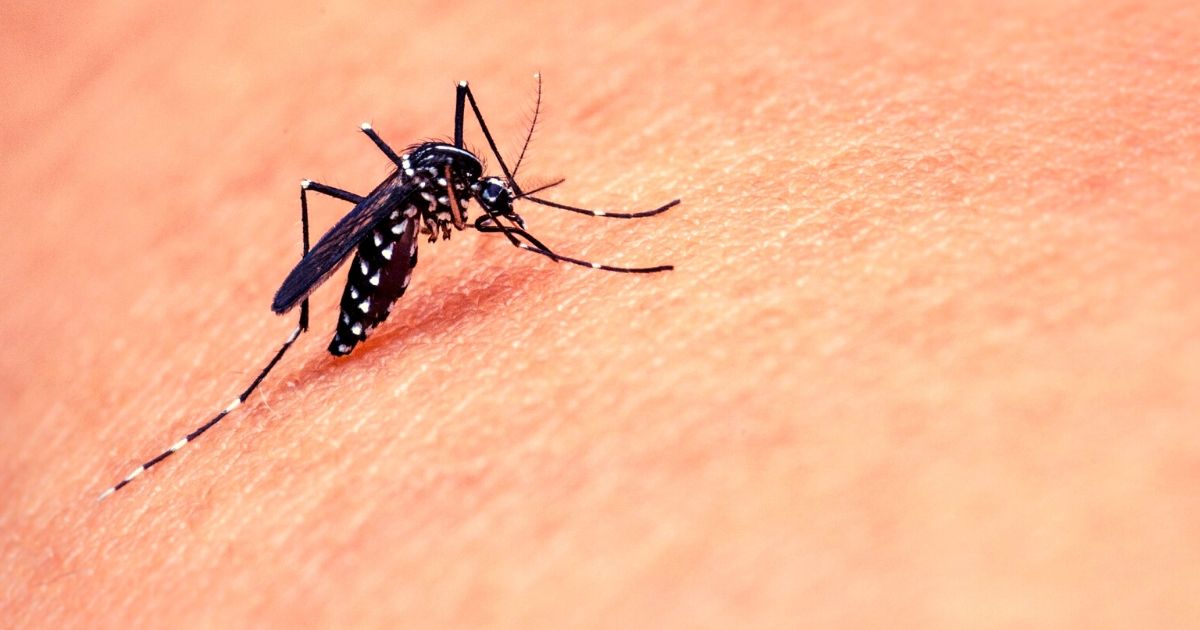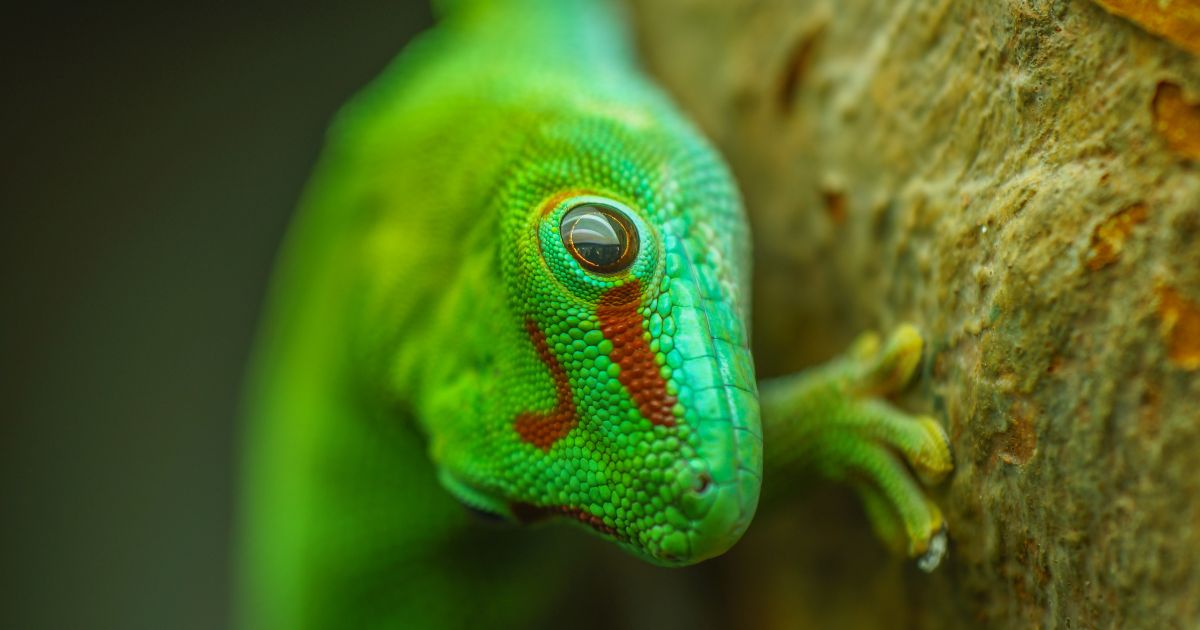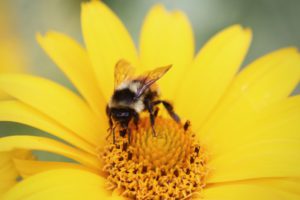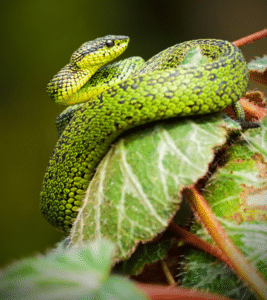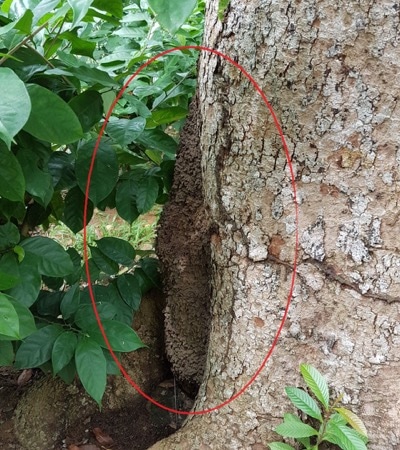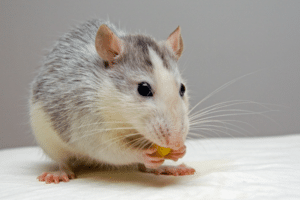The Complete Guide to Flying Ants Treatment and Prevention in Singapore
Ants
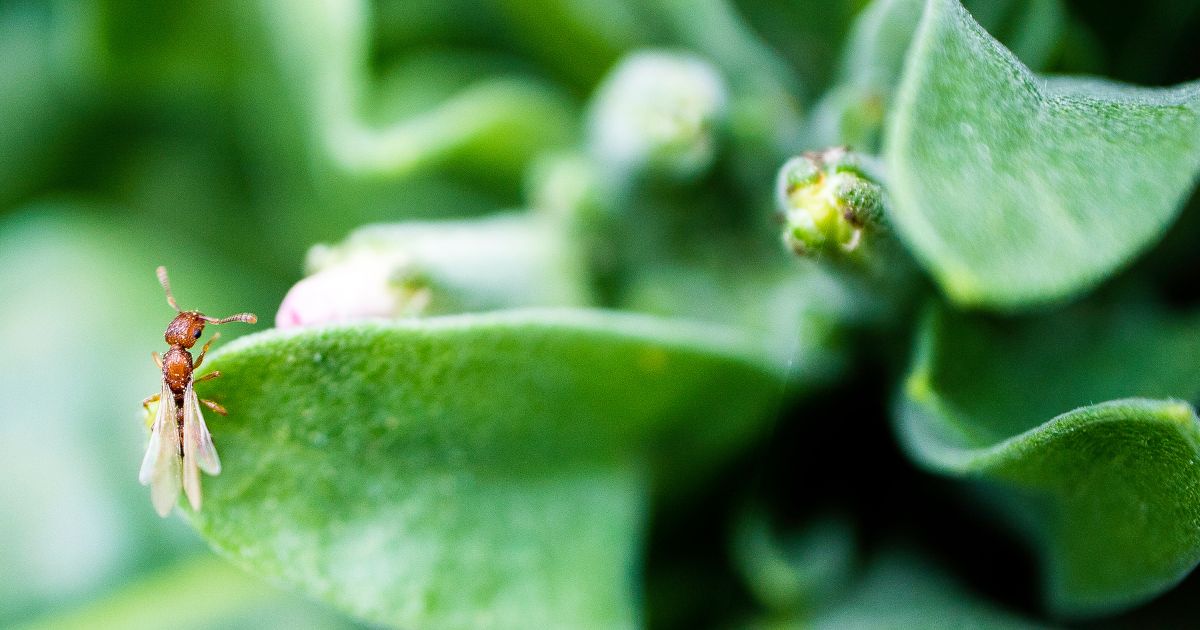
Flying ants can be occasionally seen in Singapore’s tropical climate, especially during the warm days of the rainy season. These ants are not dangerous for humans or pets, but their swarms can annoy homeowners. Understanding their behaviour and treatment methods can help you to effectively get rid of and prevent flying ants at your home.
Can Ants Fly?
Not all ants have wings and can fly, but all species of ants have flying “types” of ants within their colony. Flying ants, also called “alates”, are usually the reproductive members of the colony that develop wings during their mating period. When the colony is ready to expand, these flying ants emerge to mate and establish new colonies.
What Do Flying Ants Look Like?
Flying ants are typically black or brown with slender bodies. They look similar to winged termites, but some distinct features that can help you tell them apart. Unlike termites, ants have two pairs of wings that differ in size: large forewings and small back wings. Their bent antennae and narrow waist differentiate them from termites.
Want to find out more about ant control in Singapore?
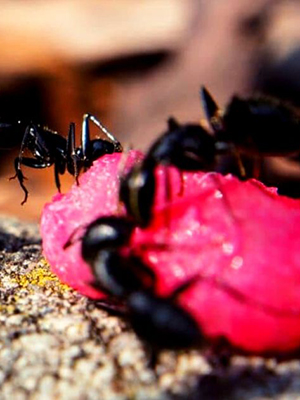
Why Do These Ants Fly?
Flying ants’ primary purpose is to reproduce and establish new colonies. It is an important part of the ants’ lifecycle. During warm and humid days, flying ants take flight in swarms to mate. Usually, the male flying ants die immediately after mating, and the fertilized females, known as queens, land to start new colonies.
Are Flying Ants Dangerous?
Generally, flying ants are not harmful to humans or pets. If a species of ants doesn’t bite or sting, their flying alates won’t bite or sting either. And if they do, it’s highly unlikely that alates will bite or sting you while flying.
However, when flying ants swarm in large numbers, they can still be intimidating or annoying to people and their presence may indicate an underlying ant infestation. Also, on rare occasions, people may experience allergic reactions to ant bites.
What Causes Flying Ants in Your House?
If you notice the sudden appearance of flying ants, it often indicates the presence of an established ant colony nearby. These colonies can exist in different locations, including the ground, structure of buildings or trees.
Usually, their emergence is triggered by favourable environmental conditions, such as temperature, humidity, and daylight hours. Several factors can attract flying ants to your house, including:
- Lights – you can notice flying ants swarming near windows, doors, or outdoor lights.
- Food sources – if you have any food or sugary drinks out, it will attract flying ants.
- Cracks in walls or foundations can also help flying ants find their way into homes.
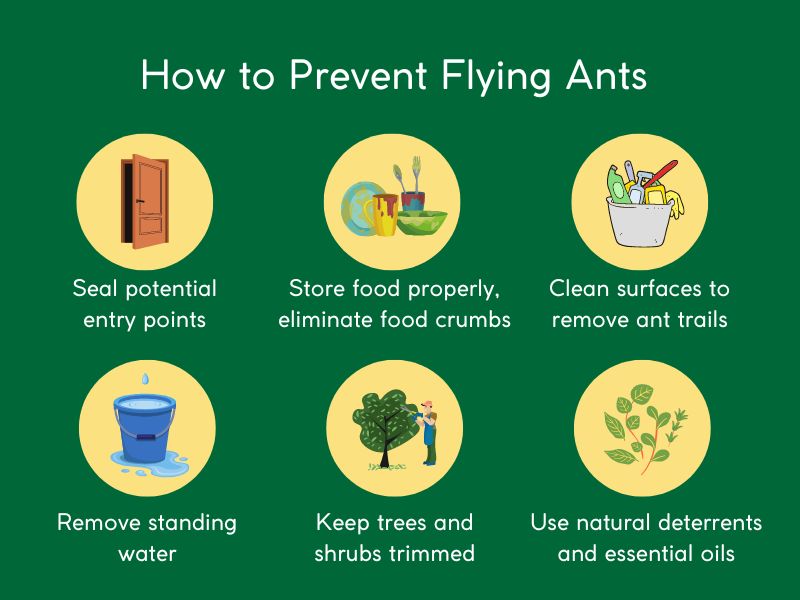
How to Prevent Flying Ants at Your Home
Depending on the species, flying ants can cause serious damage to your house and property. Here are some ways to prevent flying ants at your home:
Seal Entry Points: Make sure all cracks, gaps, and openings in walls, windows, and doors are sealed so that flying ants can’t get inside your home.
Store Food Properly: Ensure that all food is sealed and stored properly, and eliminate food crumbs or spills that can attract ants.
Maintain Cleanliness: Regularly clean surfaces to remove any ant trails.
Remove Standing Water: Address any moisture issues as flying ants are drawn to damp areas.
Trim Vegetation: Keep trees and shrubs trimmed away from your home to reduce entry points for ants.
Use Essential Oils. Some natural deterrents and essential oils with strong scents can draw the flying ants away from your house.
Ways to Get Rid of Flying Ants
If you are seeing flying ants in your house, there are a few things you can do to get rid of them.
- Vacuum up the flying ants and get the vacuum bag out of the house, so that they can’t find their way back.
- Try using fly traps to eradicate the flying ants inside your home.
- Use pesticides or natural ant control remedies, like mixing dish soap and peppermint oil. This will help you to get rid of flying and crawling ants.
- Find the ant colony by following the trail of ants to their origin place and try to get rid of it.
Pro Tip: Besides handling the flying ants themselves, it is also important to find and remove their source (colony).
By following these steps and knowing when to seek professional help, homeowners can reduce the presence of flying ants in their homes.
When to Call a Professional Pest Control Company
If you can’t get rid of flying ants, or if you have a severe infestation or persistent problems, consider contacting a professional pest control company. Trained experts can assess the situation, identify the source of the infestation, provide targeted treatments, and offer long-term solutions to prevent future infestations.
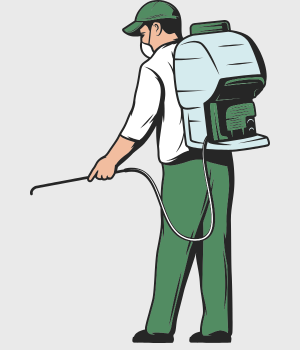
Pest Problem? Let Us Help.
We offer fast and effective precision treatments to eliminate pests while ensuring a safe environment for your home or business.
Author: Soleha Nisaa
Frequently Asked Questions
Some species of flying ants can bite, but it’s very rare for them to do so. They are usually a nuisance due to their presence rather than their biting behavior.
In most cases, the presence of flying ants isn’t a cause for serious concern. Their appearance is often a natural part of the ant life cycle. However, their sudden swarming can indicate the presence of an underlying ant infestation.
Flying ants in Singapore are often seen during specific periods, typically warm and humid days. However, their appearance can also depend on various environmental factors and the presence of established ant colonies nearby.
Flying ants themselves do not cause structural damage to buildings or property. However, if they establish new colonies inside structures, this can potentially lead to minor structural issues if left unaddressed.
Related Posts
Ant Repellents: Natural Ways To Get Rid Of Ants
Ants

We often get asked about simple DIY ant control methods. In some cases, natural ant repellents can be useful, but if you are looking to quickly and efficiently get rid of your ant problem, natural remedies are not recommended. Trained pest treatment professionals offer durable ant elimination treatments.
With that said, let’s take a look at some natural ant repellents.
Common home remedies for ants
Here is a list of 9 commonly mentioned natural ant repellents:
- Pepper
- Peppermint oil
- Lavender oil
- Neem oil
- Tea tree oil
- Lemon
- Coffee
- Cinnamon
- Vinegar
Does peppermint oil repel ants?
The scent of peppermint is not a pleasant one for many bugs including ants and mosquitoes. Peppermint oil extract offers a powerful, condensed form of the mint plant that acts as a natural ant repellent.
There are compounds available in peppermint that appear to repel ants, mainly menthol and thymol. The smell caused by the oil can also confuse ants, irritate them and they can even die because of exposure.
If you want to give peppermint oil a try, you can place about 15-20 drops of peppermint oil extract in a plastic bottle and mix it with water. All you need to do then is spray the mixture in the affected areas. Repeat the process every few days if needed.
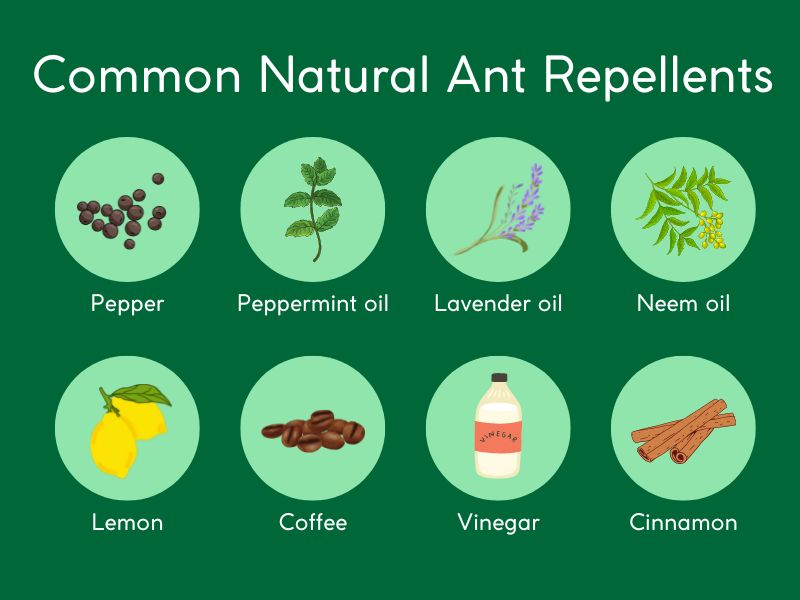
Does lavender oil repel ants?
Lavender oil is another powerful plant extract that is commonly referred to when discussing DIY ant repellents. Lavender flowers are known for their strong scent and are often used not just as pest repellents, but also in perfume. Generally speaking, human beings like the smell of lavender. To the contrary, pests like ants, flies and mosquitoes are not too keen on its smell. In fact, many store-bought natural pest repellents already contain lavender oil.
So how to apply lavender oil? Similar to peppermint, you can use a spray bottle and add a mixture of water and 15-20 drops of peppermint oil. Next, apply to the affected areas. You can also use a cotton balls for applying the mixture.
Want to find out more about ants removal in Singapore?
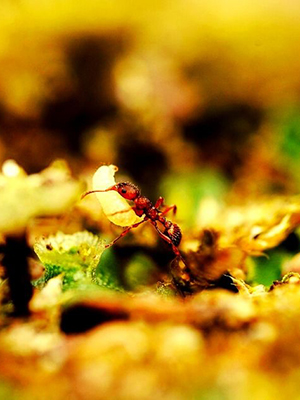
What's the best way to get rid of ants naturally?
There is no one right answer to this question. Each type of ant is different, each environment is different. And most importantly, the level of infestation plays a huge factor in whether or not natural ant repellents will work.
In Singapore alone, there are over 130 ant species. While many ants don’t like the natural pest repellents mentioned in this article, some will hardly be affected by it. Hence, you always need to keep a close eye on the presence of ants and consider contacting a pest control company in Singapore.
With that said, peppermint oil and lavender oil are two of the best known ant repellents that are worth trying out.
Pro Tip: Depending on the type of ants and the level of infestation, consider contacting pest management professionals to solve the problem before it gets even bigger.
How to prevent ants
While this article focuses on getting rid of an existing ant infestation, some of you may wonder how you can prevent ants in the first place.
As with most pest prevention tips, the first and foremost thing you need to is to keep food sealed. Ants are like hoovers and will come where there is food available. Cut off the supply of food and the likelihood of encountering ants drops significantly.
Other things you will want to do is avoid any standing water and keeping things clean, including emptying out the bins regularly.
Finally, denying access points as much as possible helps as well. That means making sure there are no cracks, holes or gaps where the ants can enter.
What if natural methods don’t work
Ants can be a real annoyance in your residence or at work. There are many treatment methods that include natural ant repellents. Some may work, some may not. The success depends on the size of the ant infestation and on the types of ants. In many cases you will need to contact a pest exterminator to get the job done once and for all.

Pest Problem? Let Us Help.
We offer fast and effective precision treatments to eliminate pests while ensuring a safe environment for your home or business.
Author: Soleha Nisaa
Frequently Asked Questions
Ant repellents are substances that are designed to repel or deter ants from entering an area. They work by emitting a scent that is unpleasant to ants or by creating a physical barrier that ants cannot cross.
Yes, natural remedies can be effective in getting rid of ants. These remedies work by disrupting the ants’ scent trail, making it difficult for them to navigate and find food.
Most ant repellents are safe to use around children and pets, but it’s important to read the label carefully and follow the instructions. Some ant repellents may contain chemicals that could be harmful if ingested, so it’s important to keep them out of reach of children and pets.
Yes, ants can develop resistance to ant repellents over time. This is why it’s important to rotate the use of different types of repellents to prevent ants from becoming immune to a particular substance, and contact pest control companies when natural repellents stop working.
The Ultimate Guide to Ant Prevention and Treatment in Singapore
Have you ever walked into the kitchen only to find ants feasting on the cakes that you forgot to place in the fridge? Or did you find the carcasses of ants in the drinks that you were just about to finish? These scenarios are familiar to most of us. The presence of ants may be a sign of a larger ant infestation. Ant infestations are relatively harmless in most cases. Severe ant infestations may cause problems and badly affect the quality of life.
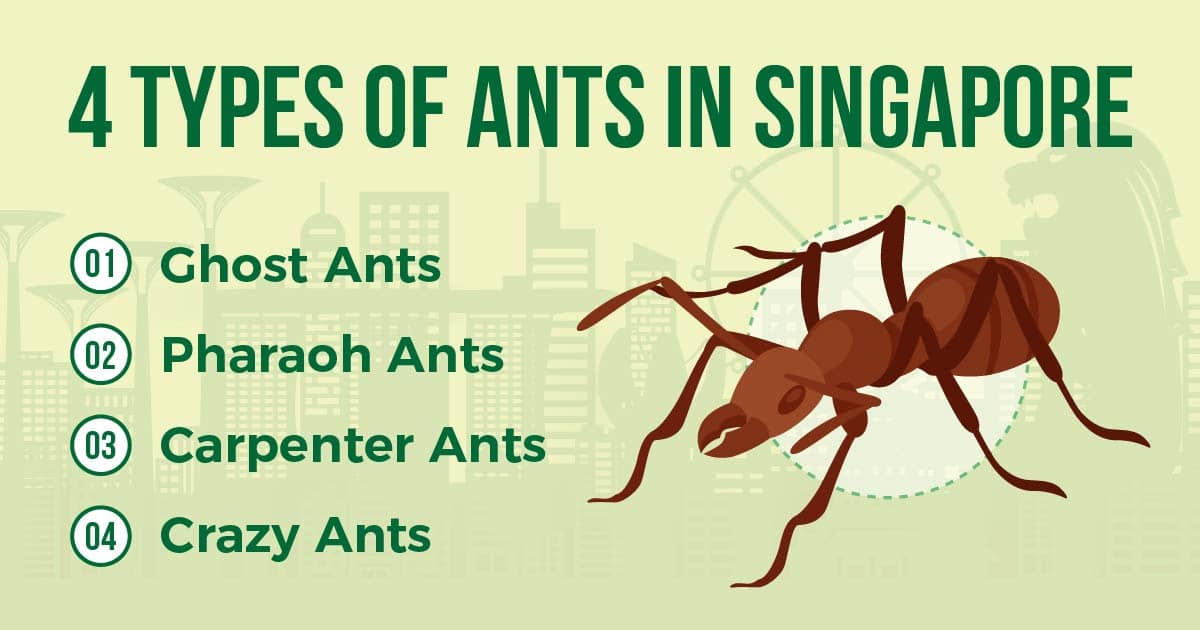
Types of Ants in Singapore
Some of the most commonly found ants in Singapore are:
These ants may enter homes searching for food and shelter. Buildings appeal to ants since they offer protection from weather and predators.
Ghost ants
Ghost ants – also known as sugar ants – love moist environments. They are usually active in kitchens. For example, inside cabinets, under the sink or behind the fridge.
Characteristics of ghost ants:
- 1.3 to 1.5mm big
- Dark heads
- Translucent bodies
- They love sweet and sugar-rich foods as they contain carbs to feed the colonies
Pharaoh ants
Pharaoh ants are a real nuisance. They can be hard to handle. Pharaoh ants are relatively resistant to pesticides. If you spray pesticides, their colony will break and move into new territories. This makes it challenging to eliminate pharaoh ants. Also, pharaoh ants tend to bite when threatened.
The characteristics of pharaoh ants include:
- 2mm big
- Distinctive golden or brown colour
- They enjoy oily and protein-rich foods
- Queens can live anywhere from 4 to 12 years
Pro tip: It is important to identify the type of ant infestation to choose the right method to treat ants.
Carpenter ants
Carpenter ants, as their name implies, live in wooden structures. Though they do not eat wood, they will create an area for their colony with their mouths. Hence, carpenter ants are sometimes thought to be termites.
Characteristics of carpenter ants:
- 15 to 17mm big
- Black and reddish-brown
- They love eating honeydew and dead insects
- Often found in moist-rich areas such as bathrooms
Crazy ants
Last on this list is the crazy ants. Their name relates to their defence techniques. Once disturbed, crazy ants will swiftly move in all directions. This makes it challenging to eliminate them.
Characteristics of crazy ants:
- 2 to 3mm big
- Long legs
- Black or dark red colour
- Antennae
- They love sugary foods (hence they will occupy similar places as ghost ants)
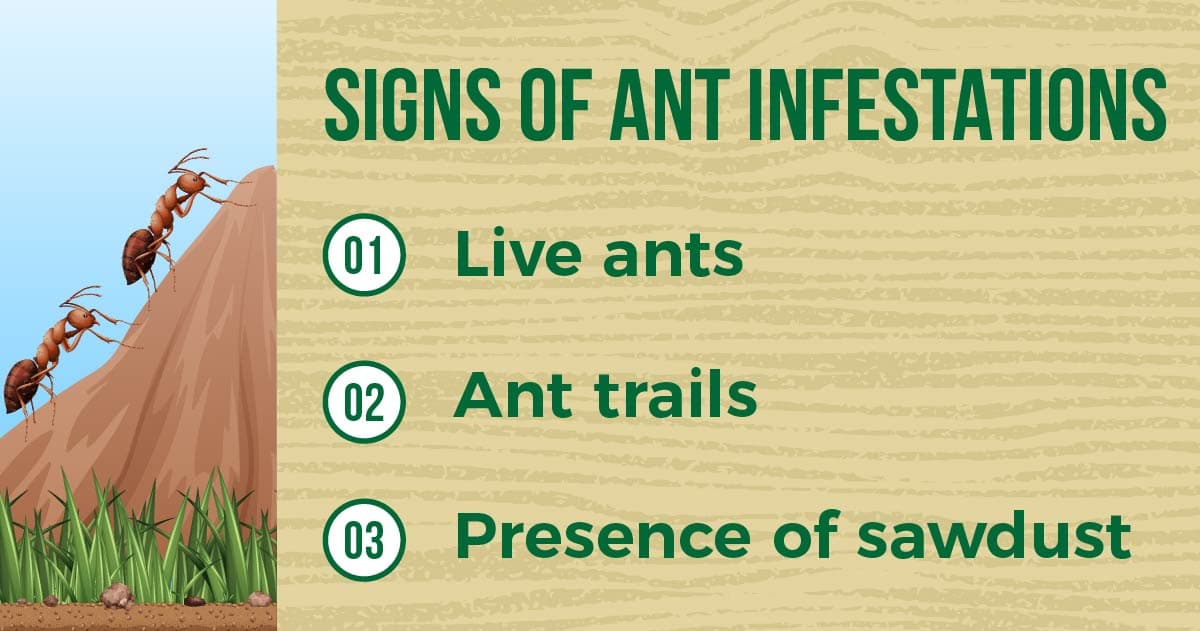
Signs of an Ant Infestation
Ants from the external surroundings may enter your house occasionally as they forage for food. Thus, you should not have to worry when you see one or two ants in the house. However, there are some tell-tale signs indicating that you might be having an ant infestation around your home.
1. Live ants
One of the most apparent signs indicating an ant infestation is the sightings of a large number of live ants. They are usually present around food and food preparation areas as they forage for food.
2. Ant trails
Ants leave a trail of pheromone as they forage. This allows other members of the colony can follow. An ant trail forms as ants travel on the same path with the pheromone. Following the ant trail may lead you to their nest.
3. Presence of sawdust
The presence of sawdust may indicate the presence of carpenter ants. Carpenter ants do not consume the wood that they infest. Instead, they expel the wood from the tunnels they make, leaving behind piles or trails of sawdust.
Want to find out more about ant control in Singapore?
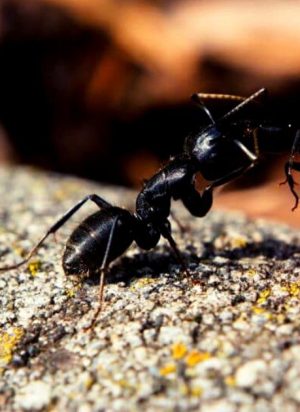
Life Cycle and Biology
Similar to insects like mosquitoes and butterflies, ants undergo a complete metamorphosis. Their life stages consist of:
- Eggs
- Larvae
- Pupae
- Adulthood
Ants are also social insects that practice a caste system. Thus, the normal function of a colony is maintained through the division of labour by different castes. An ant colony consists of a queen, alates, workers, pupae, larvae and eggs.
Reproducing
The queen is the largest individual in a colony. Her primary function is to reproduce and grow the colony. The queen only mates once but continues to reproduce throughout its entire lifespan.
A male’s sole function is to mate, and it dies after its task is accomplished.
The alates are the winged individuals that fly off to form new colonies. New colonies can also be created through a process known as budding, whereby the queen ant leaves the nest to start a new colony in another location.
Workers
The worker is the most common caste which encompasses the ants that we see in the surrounding. The tasks of the workers include:
- Foraging for food
- Feeding the workers
- Guarding and tending to the nest
Some species of ants have workers that are dimorphic. This means that the workers are further classified into:
- Major workers: larger
- Minor workers: smaller
The larvae are fragile and legless, so they need nursing from the workers.
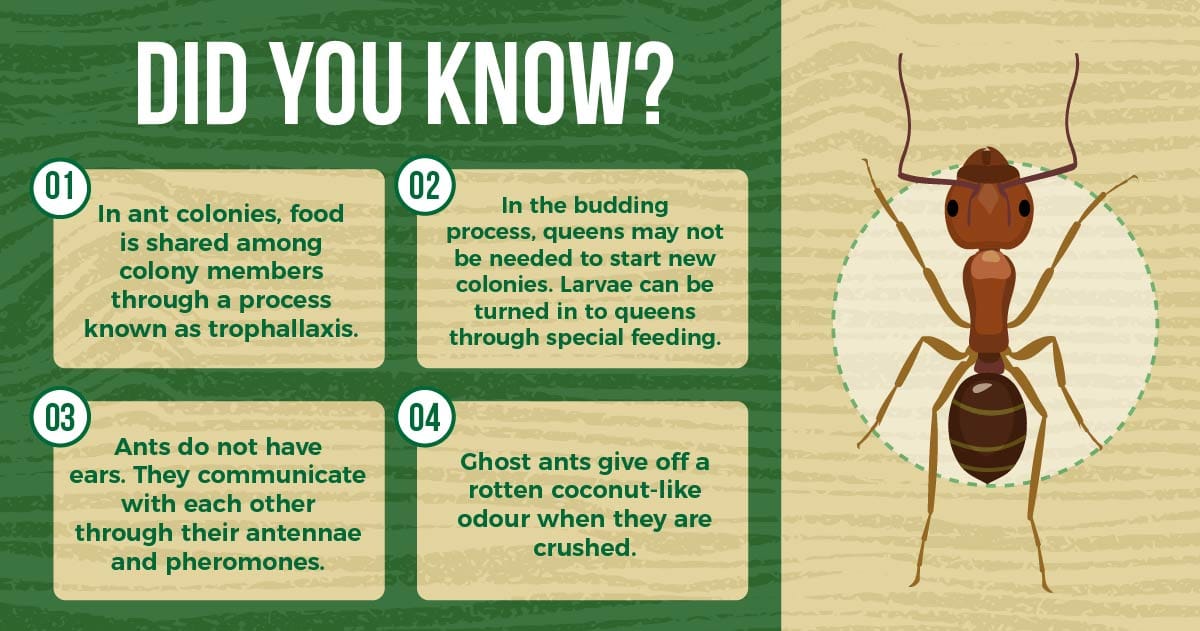
Hazards
Ants are not important vectors of diseases, so they pose little medical concerns. However, the presence of ants still poses risks to homeowners.
1. Nuisance
The sight of ants around your house may be unpleasant. Ants are an eyesore to people who hate insects. They may also climb onto your body unnoticed and cause irritation.
2. Structural damage
Severe infestation by carpenter ants may hollow out wooden structures, causing the structures to weaken. In turn, this increases the risk of collapsing.
3. Occurrence of other pests
The presence of ants may cause other entomophagous pests such as spiders and geckos to thrive. Ants serve as a food source for these pests. Thus, the increase in the food supply would undoubtedly benefit their predators.
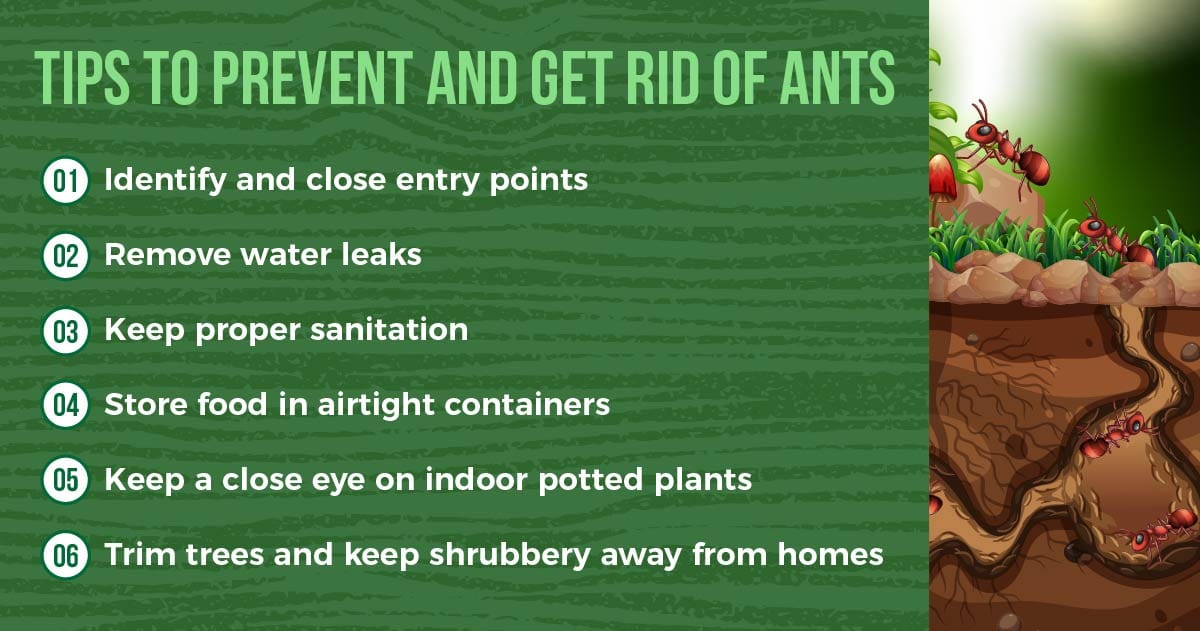
Tips to Prevent and Get Rid of Ants
6 ways to prevent and get rid of ants in Singapore:
1. Identify and close entry points
How do ants find their way into your home? Understanding this will allow you to block ants from entering. Usually, ants enter through cracks in the walls, floors, ceilings, windows and pipelines. Even the tiniest of spaces is enough for ants to enter. Prevention is key, thus your first task is to find and seal all possible entry points.
2. Remove water leaks
Water is one of the sources that ants thrive on. Ants also nest in moist areas. Therefore, water leaks are an attraction for ants. If you see ants in your house, there may well be a water leak somewhere. We recommended you to inspect your home for leaking pipes.
3. Keep proper sanitation
All creatures need food to survive. It is important to keep your home clean at all times. By doing so, you will not attract ants. Make it a habit to clean your home thoroughly, including counters, tables, floors and especially all parts of the kitchen. Regularly throwing out the garbage also helps a lot in preventing ants.
4. Store food in airtight containers
Food storages are great attractions for ants. Their tiny bodies can usually squeeze through any narrow gaps in search for crumbs and other food rests. Thus, we recommend using airtight storage containers for your food. Also, consider storing fresh items such as fruit in the fridge.
5. Take good care of indoor potted plants
Even if you follow the first steps rigidly, there is still a chance of an ant infestation. Our next tip addresses plants. As plants need water, so do ants. Thus ants are often attracted to indoor potted plants. They may even build a colony inside a pot. Hence, carefully check around plant pots for signs of ants.
6. Trim trees and keep shrubbery away from home’s exteriors
Taking care of your garden is our final tip. Why take care of the outdoors? Because this where the ants are coming from. If you want to get rid of ants, start in the outdoors. Examples include trimming tree branches and keeping things neat and tidy.

Pest Problem? Let Us Help.
We offer fast and effective precision treatments to eliminate pests while ensuring a safe environment for your home or business.
DIY Methods to Prevent and Get Rid of Ants
Ants are sensitive creatures, not only able to sense sweet stuff but also capable to detect the smells they hate. Home remedies such as cinnamon, lemon juice and peppermint can act as natural ant deterrents to prevent their access to our homes. The home remedies can be sprayed at doorways, windowsills, and potential entry points to help in deterring them away.
Professional Ant Treatment
Residual spraying is the most common method used to treat ants. However, it does not always work for all species. It is usually used when we can detect and access the ant nest. Or, the ants will not be shaken by the insecticide, which can worsen the infestation. Residual chemical can also be sprayed at the entrance or potential entry point if we want to prevent garden species from coming into our premise.
Some species of ants are hard to handle. They are eliminated but then re-appear. Some ants cannot be eradicated with insecticide spray. Thus it is important to identify the type of ant infestation.
The baiting method is preferable, especially when dealing with ants indoors. The bait that we use is a mix of an insecticide and some food attractants. It is non-repellent and slow-acting, which does not kill ants quickly. The bait will be placed at multiple locations where their activity is identified. The slow-acting nature of the bait works when the workers carry the bait back to their nest and feed it to the brood, nest mates and queen. Subsequently, the nest is eliminated.
Notice any ants? Remain calm and contact a professional to prevent further spread of ants. Our staff are licensed and certified with the National Environment Agency (NEA). Our service technicians understand the habits of different types of ants and will provide the correct type of treatment.
Frequently Asked Questions
Related Posts
7 Tips on How to Get Rid of Ants
Ants
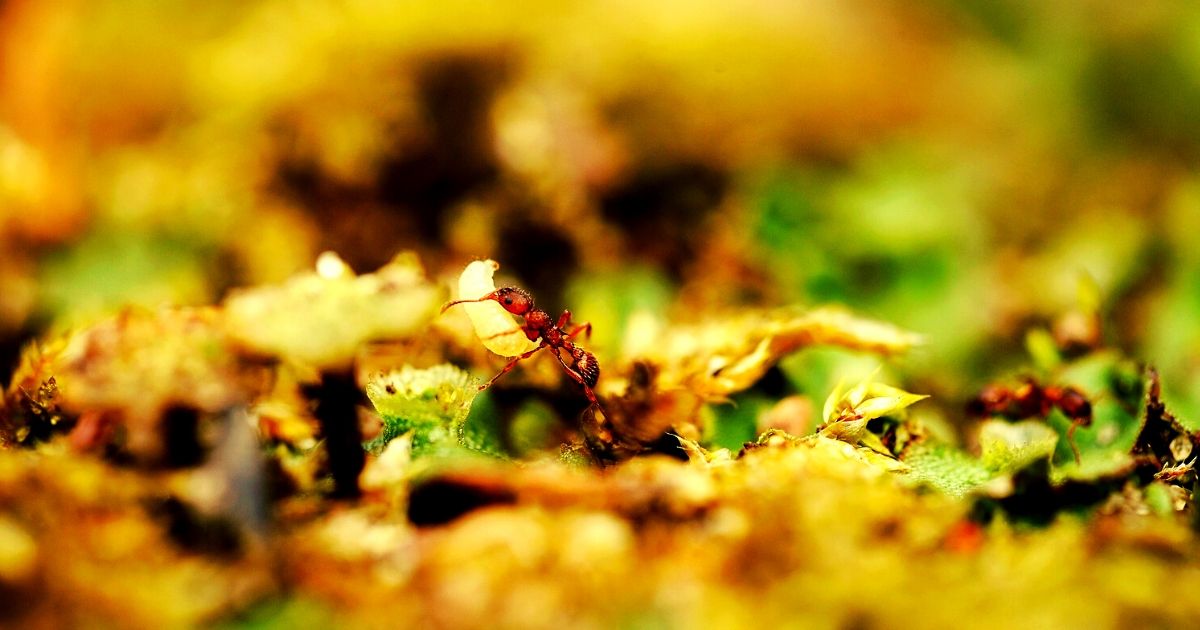
Waking up early in the morning to prepare a delightful breakfast for your loved ones is a sign of a good start to the day. However, unpredictable threats often follow after our expectations. You might be familiar with the situation that a group of ants, the nuisance intruders, infested your well-prepared food when it was out of your sight. You might also face seeing carcasses of those intruders floating on the surface of your drinking water after a few minutes on the dining table. Well, if you have encountered any of the above situations, now is the time to read on and get rid of the trauma. In this article, we answer the question and give tips on how to get rid of ants.
Ants are neither disease vectors nor carriers. However, their presence can be traumatic as they may sting, bite or damage our home structures. Pustules and blisters may be formed following the sting of fire ants.
Some ant species also transmit germs to humans.
Ants’ activity may still be present even though treatment actions had been done on it. It is most likely that improper control techniques were used by homeowners to deal with them without knowing their species, biology, and behaviours. Here, we provide you with the correct ways how to get rid of ants.
How to Get Rid of Ants
1. Identify the Entry Point
Understanding how ants find their ways to invade our homes is always the first step to curbing them.
The invasion of ants usually starts with the cracks and crevices in the wall, seam of walls, floors, ceilings, corners or windows, and gaps around the utility lines or pipes.
We often pay less attention to these areas while they actually provide enough space for tiny ants to access our homes. But it’s not too late for you to prevent them from entering! Giving you a task as a home protector, it is time to start investigating any potential entry point in your home. You may use silicone-based caulk to seal if you find those entry points.
2. Remove Water Leaks
It is common that we don’t realise the existence of water leaks in our homes. In this situation, ants can be beneficial to alert you that water leaks may be inside your property!
Water is one of the main sources for ants to thrive on.
Furthermore, they prefer to nest around moisture sources. Hence, if you find ants inside your home, you might want to start inspecting any leaky pipe or water source for them. Make sure you repair the leaky pipe as there is higher chance for them to coming back. If you want to know how to avoid or how to get rid of ants, this is an important part of it!
Want to find out more about ant removal in Singapore?
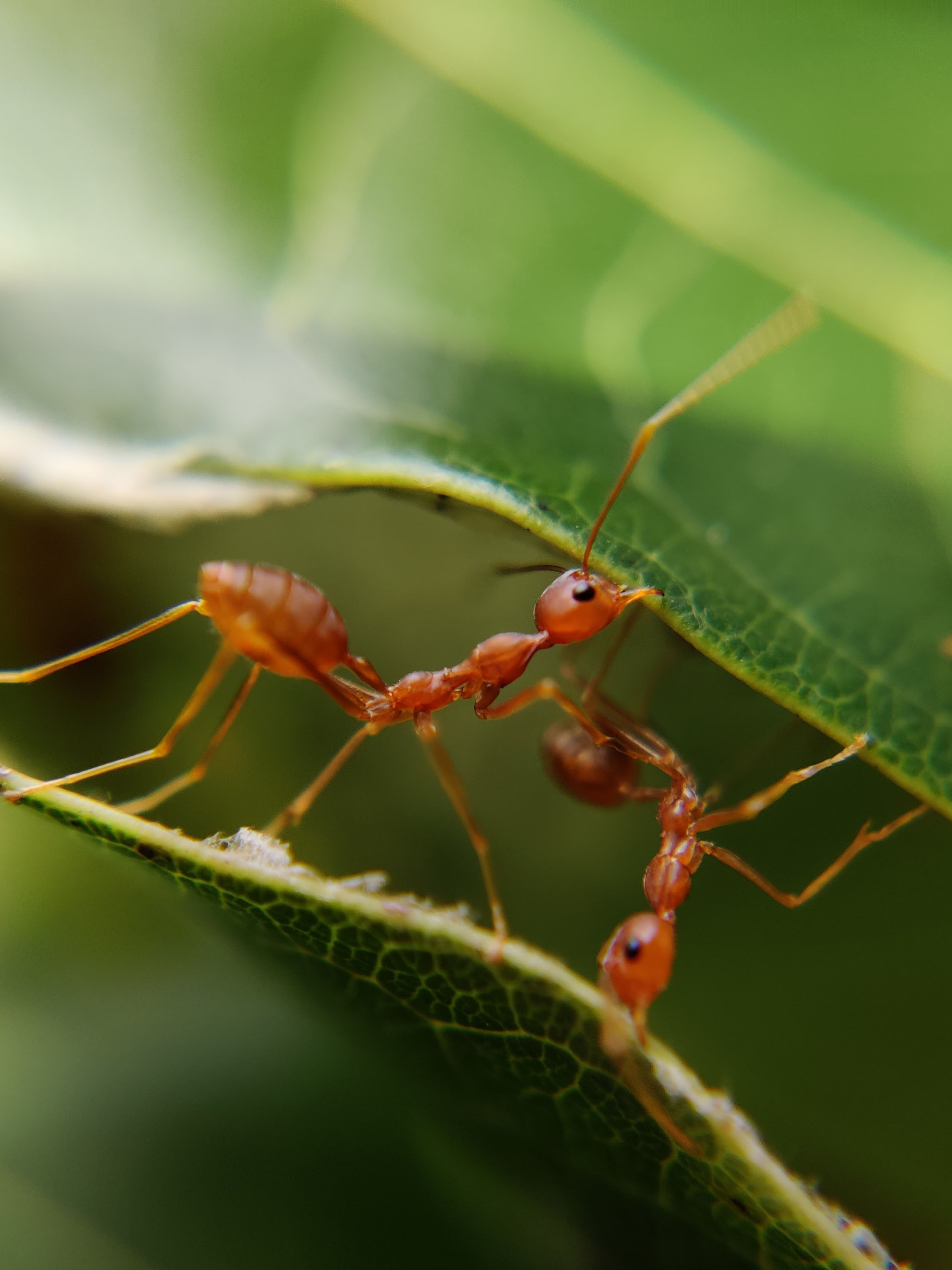
3. Keep Proper Sanitation
Food is a must for all living creatures. Keeping your home tidy, especially the kitchen area, can help to quell their activities. Foster a good habit of tidiness by regular cleaning of your home not only to keep ants but other pests away as well. Counters, floors, table and kitchen appliances are usually their favourite forage areas. Sweep or wipe down these areas as to remove any crumbs of food and spills of juice that can serve as an attractive food source for them. In addition, remember to dispose your garbage and trash on a daily basis.
4. Store Food in Airtight Containers
Don’t be surprised if you find ants inside your stored food since they are so tiny that they can squeeze through any gap formed between objects. Hence, make sure you store your food in pest-proof or airtight containers. Furthermore, ripe fruits or other food sources like bottles of opened juice or wine should be stored in the refrigerator since there might be some sugar-based residues on the outer surface.
Pro Tip: Hiring professional pest control companies makes it harder for ants to develop in your home.
5. Look out for the Indoor Potted Plants
You might get frustrated by the reoccurrence of ants inside your house even though you have done the first four steps. Here is another tip for you – take note of the indoor potted plants! Plants need water to survive, the same goes for ants too! Ants may have built their colony inside or around your indoor potted plants before you take precautionary steps against them. Hence, carefully check around your indoor potted plants and look for the signs of ants’ activities. If you found them inside, you have to remove and replace the infested soil. Make sure to always remove accumulated water inside the drainage plate at the bottom of your plant pot as these can serve as the water source for them.
6. Trim Trees and Keep Shrubbery Away from the Home’s Interior
Keep in mind that ants usually come from the outside environment. Thus if you want to know how to get rid of ants, start outside. The reasons for their occurrence inside a house are always food, water and shelter. Therefore, preventive actions against them at your home’s exteriors cannot be neglected. Trimming tree branches away from touching the wall and roof of your house can help to reduce their entry.

Pest Problem? Let Us Help.
We offer fast and effective precision treatments to eliminate pests while ensuring a safe environment for your home or business.
7. Get Help from a Professional
Some species of ants are just too troublesome to be eradicated such as pharaoh’s ants and crazy ants. Somehow, we eliminate a species, while a few weeks or months later a secondary species of ants come out from the same treated spot. Hence, identifying the ant species is crucial as there are some ant species that cannot be treated with insecticide spray but specifically designated bait. From a young age, we may have the same concept that ants love sugar-based food. However, that is not always true! Some ants prefer to feed on oil-based food while some even prefer MSG-contained food (monosodium glutamate, a common flavour enhancer in food)! Don’t panic if you see them, keep calm and get help from our trained professionals to keep your home free from them!
Frequently Asked Questions
Ants may suddenly appear in your house if they have found access to sugar or food. They can also be on a hunt for water and shelter.
Typically you will need to get rid of things that attracted ants to your home in the first place, like spoiled food or leaking water. However, this might be not enough for ants to go away on their own.
To get rid of ants inside your home, clean up your house, fix all the cracks and holes in the building, and use repellents or pest management services.
To get rid of ants outside of your home, find their nest and pour boiling water or outdoor insecticide over it. Also, keep your yard clean and remove any branches, bushes, or anything that touches your house and provides ants with easy access to it.
Related Posts
Killem Pest Profile: Ants In Singapore
Ants
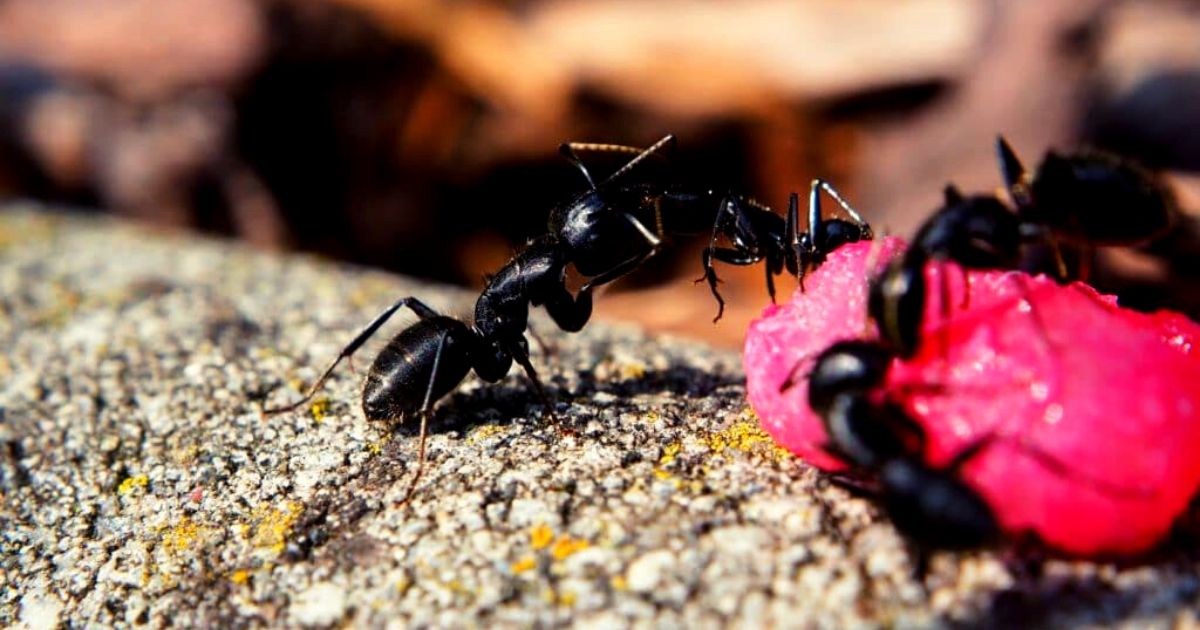
There are over 130 species of ants in Singapore as of 2018, with many coming from other regions of the planet due to increased trade.
Ants are social insects that form colonies that range in size from a couple of dozen to over a million individual members. Most ant colonies possess a hierarchical structure where every individual possesses a job. It’s not uncommon for these pests to be divided between the queen, soldiers, and drones. Ants are true insects with three body segments: the head, abdomen, and thorax. They also possess six legs and identifiable antennae on their heads.
Ants are well-known for their division of labour and ability to solve complex problems.
When they enter a property, it can be hard for the owners to kill them.
Many species of these pests leave hormone trails so ants know where to go to find food. They can also identify unsafe spaces based on where the trails end. The older, more experienced drones will also train their younger counterparts how to find food and will lead them to resources through a process called tandem running.
In Singapore, it’s not uncommon to suffer an ant infestation due to the climate and the number of species that frequently plague urban areas.
The 6 Most Common Types of Ants in Singapore
The four types of ants which homeowners in Singapore need to worry about are the ghost, pharaoh, carpenter, and crazy varieties. All of these pests will enter properties in search of food and resources. They might also find buildings attractive because they provide shelter from cooler weather and natural predators.
When dealing with an infestation, people are most likely to encounter a colony of ghost ants.
1. Ghost Ants
Ghost ants are also called sugar ants and favour moist environments. They are commonly found in kitchens in places like under the sink, in cabinets, or behind appliances like the refrigerator. This type favours sweet and sugary foods which possess the carbohydrates ghost ants to need for their colonies and survival. Ghost ants are roughly 1.3 to 1.5 mm. long and are characterized by their dark heads and translucent bodies.
2. Pharaoh Ants
Pharaoh ants are difficult for property owners to handle. These pests do not react well to pesticides. When sprayed, the ants will break up their colony and scatter to new locations, making them difficult to eliminate. Pharaoh ants will also bite when they feel threatened. They are 2 mm. long and feature queens who can live between 4 and 12 years. Each ant is recognizable because of its distinctive golden or yellow-brown colour. They are nocturnal and like to eat oily or protein-rich food and will live anywhere that they can form a colony.
Want to find out more about ant removal in Singapore?
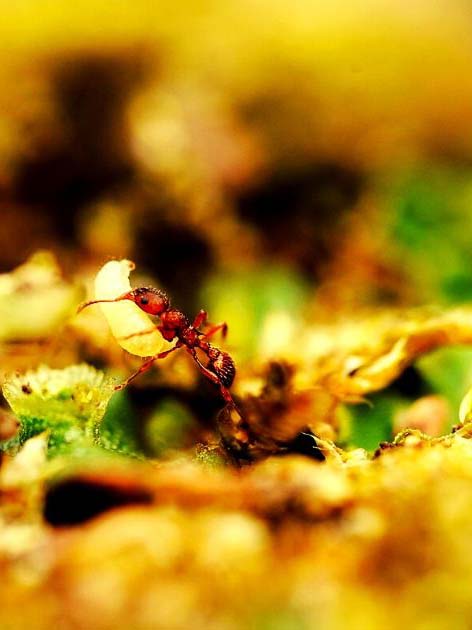
3. Carpenter Ants
Carpenter ants derived their name from their habit of living in wooden structures and trees. They do not eat wood but will carve out an area for a colony with their mouths. Because of this trait, they are frequently mistaken for termites. Carpenter ants can be large, measuring up to 15 or 17 mm. in size. They are typically black and reddish-brown and enjoy eating honeydew and dead insects. Because they are attracted to moisture, people will find them in bathrooms, kitchens, and other frequently damp areas.
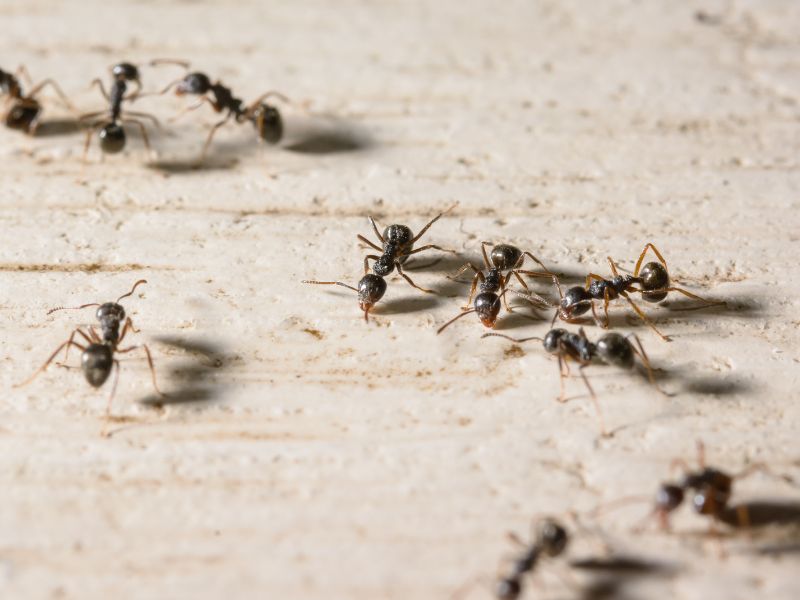
4. Crazy Ants
Finally, there are crazy ants. Crazy ants have long legs and are typically black or dark red in color. Their name comes from one of their defensive techniques. When the colony is disturbed, they will scatter in all directions, making them difficult to kill. They can be 2 to 3 mm. in length and have long legs and antennae which give them a distinctive appearance. Crazy ants feed on all types of food but prefer sugary materials, so they will frequently live in the same region as ghost ants.
5. Fire Ants
Fire Ants are aggressive small ants, around 2 to 6 millimeters in length, with reddish-brown to reddish-black bodies. They have painful and venomous sting. The venom from fire ants bite can cause discomfort, redness, itching and even allergic reaction. Fire ants establish their nests in soil and can often be met in lawns, parks, and similar areas. These ants are highly protective of their territory and will aggressively defend their nests. Because of their aggressive behavior fire ants are considered a pest.
One of the most fascinating facts about fire ants is their social structure, which is built around a queen. The size of fire ants queen can be up to 28mm in length, it is the largest ant in the colony and is responsible for laying eggs. A mature fire ant colony can contain hundreds of thousands of worker ants, depending on its age and size. These workers are responsible for maintaining the nest and protecting their queen.
To tackle a fire ants problem, you must first understand their habitat and behavior. Identifying their nesting sites and taking necessary precautions can help mitigate their presence. Additionally, some natural predators, such as parasitic flies, can help control fire ants populations.
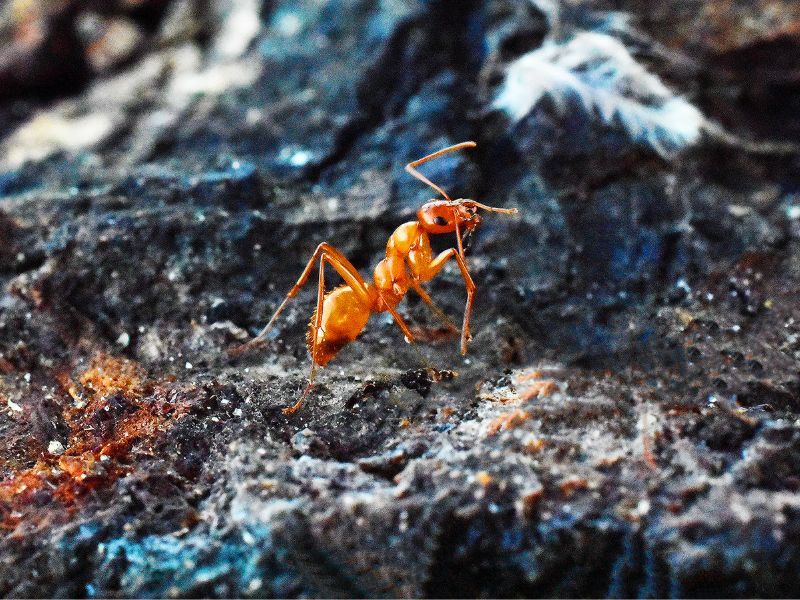
6. Weaver Ants
Weaver ants are bright coloured ants with slender bodies, typically around 4-10 millimiters in length. They usually reside in trees or shrubs, providing protection for certain plants in exchange for sugary food. Weaver ants are not considered pests as they play an important role in pest control and flower pollination. However, their aggressive behaviour can cause discomfort: weaver ants are highly territorials and can bite when defending their nests.
Signs of an Ant Infestation and Prevention Methods
It can be difficult to tell if ants are on a property. The easiest ways to tell are to locate an ant nest near your home, usually made of dirt, or to see a live ant as it searches for food.
Pro Tip: The best method of handling ants is to prevent an infestation before it begins.
Because they are attracted to buildings because of food, it’s important to clean up spills, crumbs, and messes.
All food packages should be kept sealed and excessive moisture should be wiped up. It’s also crucial to ensure that ants do not have a way of entering a building. Sealing cracks around doorways, windows, and walls can close off potential entryways and keep buildings safe from this pervasive pest.
How do I Get Rid of Ants?
- Seal all possible entry points
- Clean and make sure there are no bread crumbs!
- Regularly dispose of the trash
- Call a pest control company
Frequently Asked Questions
According to research by the international team, there are 409 species of ants in Singapore, 34 of which are specific to Singapore only.
Ants love the warm and humid weather, so it is very common to find ants in Singapore (outside and inside the houses).
Related Posts
What is Entomophobia?
Ants
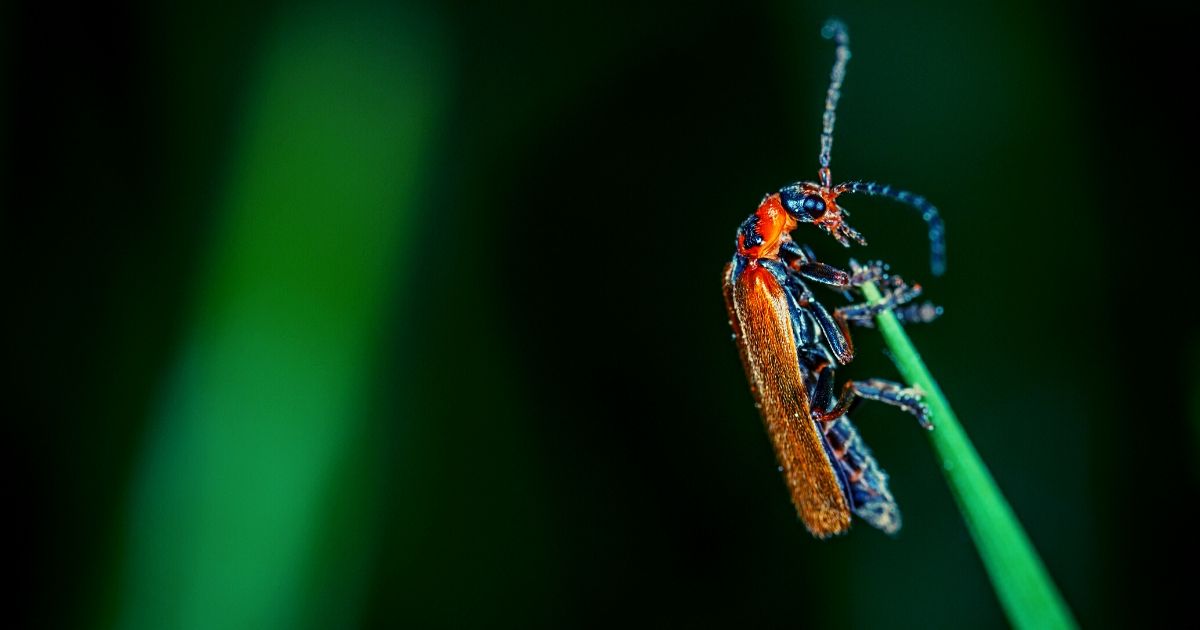
In our previous Interview with Leading Entomologist Dr How, Dr How gave us an introduction to the term ‘entomology’. To recap, entomology is the study of insects, though some people use it to colloquially refer to bugs of all kinds, including spiders. People who study insects are called entomologists. The word is based on Greek, where “entomon” means “insect” and “logia” means “the study of.”
It is an interesting field that often intersects with other academic disciplines, including genetics, physiology, biology, and chemistry.
At present, there are more than 1.3 million species of insect in the world, which make up 2/3 of the planet’s entire population. Thanks to entomologists, humans understand many things about a type of creature which outnumbers them by a factor of several hundred.
What is Entomophobia?
While entomologists enjoy studying insects, many other people are repulsed by them. Worse still, there are some people in the world who suffer from entomophobia, or the intense fear of insects.
People with entomophobia have:
- An irrational fear of insects and will often take great pains to avoid them.
- Many sufferers will experience horrific anxiety and terror simply from seeing an insect or thinking about one.
- It can also be subdivided into additional phobias like myrmecophobia (the fear of ants) and apiphobia (the fear of bees).
It is important to distinguish entomophobia from a general fear of bugs.
Many people with entomophobia know that insects pose no real threat to them, but they still experience a persistent sense of anxiety around them.
There have been many cases of a sufferer thinking about an imaginary insect and being thrown into a panic attack. Often, sufferers will go out of their way to avoid encountering an insect: some will completely change their route to work if they see an ant, or will refuse to go outside at all.
Ultimately, the main characteristic of entomophobia is that the fear must be constant, irrational, and debilitating for the sufferer.
What Causes Entomophobia?
There are several possible causes of entomophobia. One of the most commonly heard causes is people’s past experiences with insects. Let’s say you encountered a cockroach or a rodent years ago, and it freaked you out. This may leave a deep imprint in your mind. Some may even call it a traumatizing experience.
Another cause could be a direct health threat from insects. An allergic reaction to a bee sting can cause entomophobia.
People around us have a big influence on how we think and look at the world. If any of your close relatives suffer from anxiety or phobia, it can increase your risk of entomophobia. Another way is when you hear friends or family talking about their fear of insects.
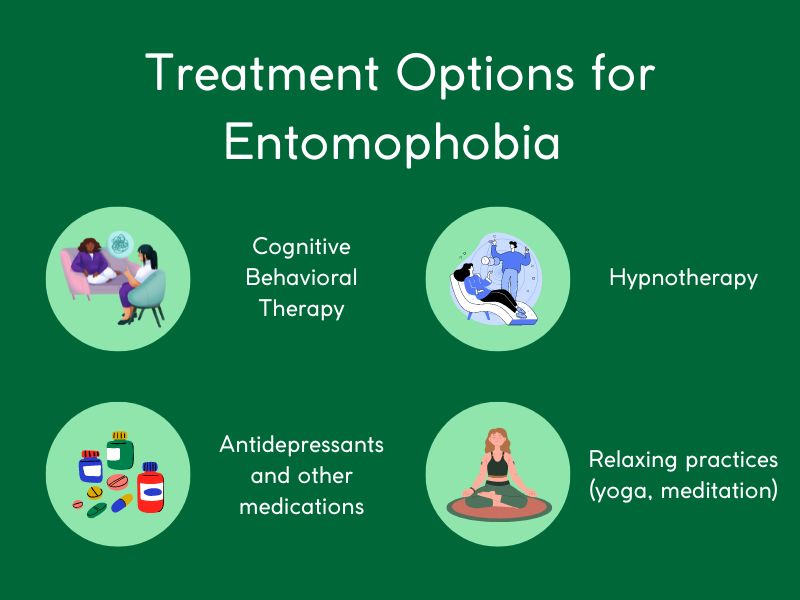
How is Entomophobia Treated?
Thankfully, modern medicine and psychology have developed coping strategies for people who have entomophobia. One of the most common methods is systematic desensitization, where somebody slowly exposes themselves to their fear.
Some examples would be a person who looks at a photo of an insect one week. Next week, they work up the courage to touch the picture. A week later, they visit a zoo and watch the insect move around. Possibly the week after that, they could touch the insect and see it means them no harm.
Pro Tip: It is recommended that a person receive help from a therapist so they do not try to do too much DIY methods at once.
Another, less common, method that can be used is hypnosis. During hypnosis, a person is placed into a trancelike state by a trained professional. The hypnotist then talks to the patient to determine the source of their fear, and can begin to help them cope.
Often a hypnotist will start small by suggesting to their patient that they do not have a reason to be afraid of insects. They can then implant the thought that when the patient awakens, they will no longer have entomophobia. They will face their fears head on and will no longer be afraid. For this method to work, a person needs to believe in hypnosis, and it often takes many sessions.
Either way, patients can use both methods to help them overcome entomophobia, a real condition which can cause unnecessary strain on its sufferers.
The Cleveland Clinic mentions several techniques that may help treat and overcome entomophobia, including:
- Cognitive Behavioral Therapy (CBT)
- Hypnotherapy
- Antidepressants and other medications
- Relaxing practices such as yoga and meditation

Pest Problem? Let Us Help.
We offer fast and effective precision treatments to eliminate pests while ensuring a safe environment for your home or business.
Frequently Asked Questions
Yes, entomophobia and insectophobia both mean the fear of insects. People with this phobia feel anxious when they see or think about insects.
Entomophobia is considered a relatively common fear around the world. For example, it is estimated that around 6% of adults and 10% of children in the US struggle with entomophobia.
If you feel anxious or experience physical symptoms like itching and crawling sensation under your skin when thinking about insects, and/or you avoid getting in contact with insects, you might have entomophobia.
Entomophobia can significantly impair a person’s quality of life. Common complications associated with entomophobia include anxiety and panic attacks, avoidance behaviors that can also lead to social isolation, secondary phobias, such as agoraphobia (fear of open spaces) or acrophobia (fear of heights), sleep disturbances, and even physical health issues.
Related Posts
What Common Pests Are Found in Your Garden?
Ants
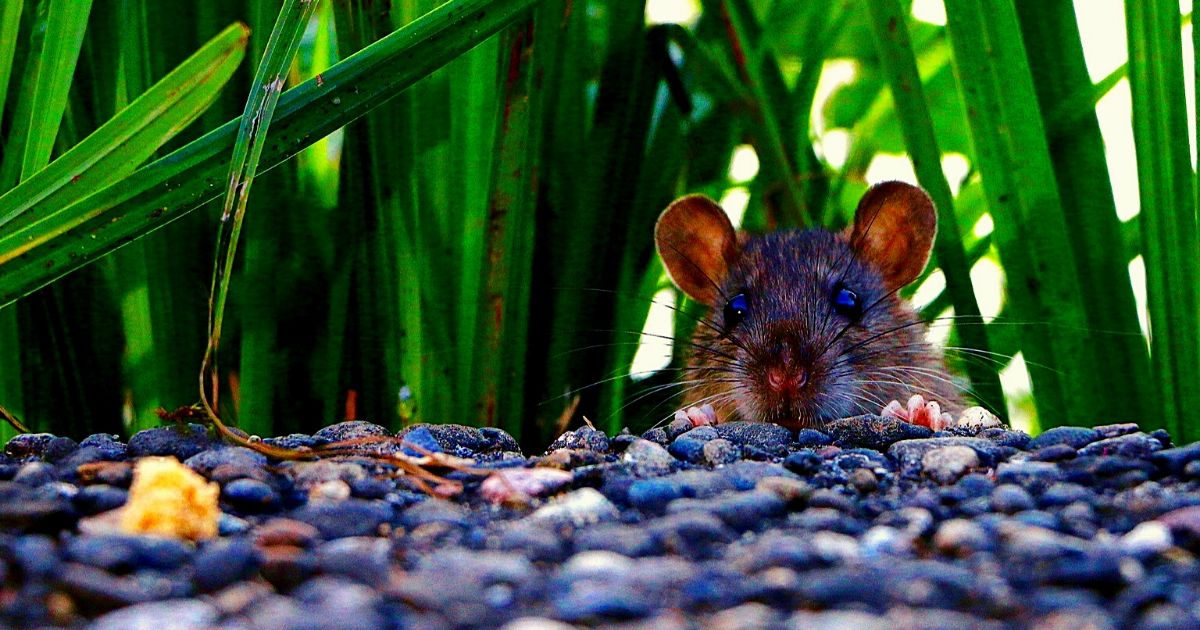
You may love spending time in your backyard and tending to your garden. Your children and pets also enjoy playing outside. Perhaps you grow flowers, or vegetables and fruit for you and the family to eat. However, many different types of pests enjoy the garden just as much as you do, and that can be a problem. Let’s take a look at some of the most common pests that like to hang out in the garden.
Table of Contents
Bees and Wasps
If you see a bee or two in your garden, it’s not usually a sign to worry. In fact, bees are essential for pollination, and they can do your garden, and the rest of the gardens in the area, a favor. However, when it comes to wasps, or if you have too many bees that are causing problems, you may want to contact a bee or wasp removal specialist to have them removed because the stings are not only painful, but may also be fatal to people that are allergic to bee and wasp stings.
Snakes
Most people hate seeing snakes in the garden, and they do have the potential to be a problem.
If you have non-venomous snakes that are small and not overly aggressive, they can help to control the rodent population, which is another garden pest we will discuss.
However, if the snakes are venomous, if it is very big, if you are unsure about them, or if you simply have a fear and dislike for snakes, you should have them removed as soon as possible. This is an especially good idea if you have children or pets.
Termites
If you notice termite mounds in your garden, this is a very bad sign and an indication that you already have an infestation. While those termites will not be interested in the flowers and vegetables you are growing, they will be interested in marching to your house so they can start eating the wood so get a termite control specialist in to remove them as soon as possible.
Rodents
Rodents in the garden can be very destructive. They may start to eat at the items you are growing, and they are disease carriers. Nothing good comes from having rodents in the garden, and they may also decide to move inside your home where they can get at even more food and cause more issues.
Mosquitoes
Mosquitoes are very dangerous, not just annoying. These pests carry diseases, such as the Zika Virus and Dengue. They breed in areas of standing water, which could be a bird feeder, a puddle, or a water collection bin. It is always a good idea to have someone take care of the mosquitoes before they become a problem.
Want to find out more about pest removal in Singapore?
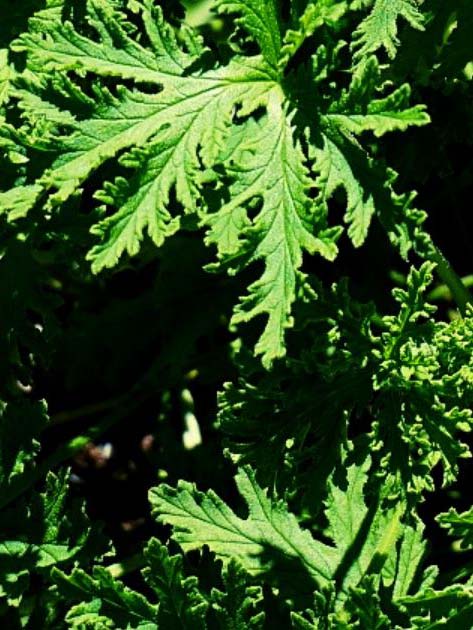
Ants
Depending on the types of ants in the garden, it might not be a problem.
Smaller ants can help with the pollination as they are crawling around the garden, and they can also help to keep caterpillars and other types of pests at bay.
They do not generally cause issues by eating anything in the garden, but if you have a lot of ants, they could always decide to head inside. It might still be a good idea to contact pest control.
Pest Control for Gardens
We have a list of the common garden pests in Singapore. Now let’s discuss some natural ways to protect your garden from pests.
Apply the following solutions to keep most common garden pests away:
- Citronella plants to prevent mosquitoes.
- Avoid overwatering to reduce high levels of dampness, as this attracts many types of pests.
- Dust off the leaves of plants to eliminate potential nesting sites.
- Dish soap mixed with water in a spray bottle can help get rid of many pests that settle on plants.
Pro Tip: Some natural remedies can be ineffective and make pest problems worse, so the best way to get rid of garden pests is to call a professional for help.
What Should You Do?
If you have pests in the garden, the best way to get rid of them is to call a professional for help. They can come and look at your problem, and then determine the best way to proceed and to provide you with a pest free environment.
If you would like more information on how Killem can help you keep your garden pest free, visit our residential pest control services page.

Pest Problem? Let Us Help.
We offer fast and effective precision treatments to eliminate pests while ensuring a safe environment for your home or business.
Frequently Asked Questions
Pests can cause major damage to your garden. They can chew holes in your leaves and feed on roots, which kills the plants.
Sometimes pests are not visible, but you can identify them by the damage in your garden, like holes in leaves, small grubs around the roots of container plants, and skeletonized leaves.
The best way to get rid of the pests is to prevent the infestation in the first place. Check your plants regularly and take measures as soon as you spot the signs of infestation.
Related Posts
How to Carry Out Safe Pest Control with Children and Pets in Your Home
Ants

Let’s be honest, no one wants to have pests in or near your home, especially when you have children or pets.
Infants and babies may be exposed to more pesticides than adults because they often spend more time closer to the ground, touching furniture bases or playing in the gardens where pesticides may have been applied. Infants and babies are also more likely to put fingers, toys and other objects that may have come into contact with pesticides into their mouths.
There are many different types of pests that can cause serious problems if they get out of hand, and you need to find ways you can control those pests safely and efficiently, without compromising the health and safety of your children and pets.
You can do some basic things that will help to keep the pests out of your home, but there might come a time when you need to call in the professionals.
What Are the Most Common Types of Pests?
While there are many different types of pests that could be plaguing your home, some of the most common and intrusive include:
Pests have the potential to destroy your home, get into your food and carry diseases. You should never have to live with pests. You should find ways to eradicate them.
What Are Safe Pesticides?
When it comes to choosing pesticides that you want, or you want your professional provider to use in and around your home, you need to be very careful. Many brands on the market are full of chemicals that could harm your children and your pets if it were ingested.
When you are choosing pesticides that you can use to deal better with the pests that you find, you should look for those that are organic and that do not have toxic chemicals in them.
One of the best things about working with Killem Pest for your pest control needs is that we use original, non-generic chemicals that are environmentally friendly and have low mammalian toxicity. This means that even if children or pets accidentally ingest the pesticide, they would not become ill.
Pro Tip: To choose an effective pesticide, you need to know what pest you are dealing with.
In addition, you can do other things that will help to keep your children and pets safe. If you are putting out bait for rodents, for example, never leave it in an area where your children or pets could have access to it. They could put it in their mouth. Instead, put the bait into a locked bait station or in an area that cannot be opened or reached by children or pets so that only rodents can access it.
If the pest control company has come and sprayed, make sure that any of the residual spraying has dried before allowing children or pets into the area. Make sure your animals are not licking the plants or the walls where the chemicals were sprayed, too.
You should also always make sure your children wash their hands after they have been playing outdoors, and stress the importance of not touching any bait stations that you might have.
How to Keep Pests Away
The following are some very simple and basic tips that can help you to control some of the pests in and around your home:
- Keeping your food in airtight containers can help to control the influx of ants, as well as rodents and roaches.
- If you have fruit that is left out on the counter, check it regularly to see if there are any bad spots on it, as this can draw fruit flies and other types of pests.
- A natural type of pesticide that you can make at home is citrus oil. You can use equal parts orange peels and water, and simmer them. Remove the peels and put the water into a spray containers and then spray around the windows, doors, and other areas where pests might be getting into the property.

Pest Problem? Let Us Help.
We offer fast and effective precision treatments to eliminate pests while ensuring a safe environment for your home or business.
Call in the Professionals
Of course, when it comes to pest problems, sometimes, the DIY home pest control methods are simply not enough. You need to call in the professionals that can provide you with a thorough service and remove those pests for good no matter what type they might be.
Frequently Asked Questions
The safety depends on the products and quality of services that you use, but generally, products for household insects pose no threat to people or pets. That is of course if the products are applied correctly and at low concentrations.
Modern pest control methods are designed to target pests and remain safe for children and pets in your house. Professionals are trained in safe application techniques and use only safe and approved products.
Although it’s not always necessary, some people feel comfortable taking their children and pets out of the house during pest treatment. Overall, you need to give the products time to dry before letting your household members have free access to the treated areas.
Related Posts
When Will You Most Likely Need Pest Control in Singapore?
Ants

Many people wonder if pest control in Singapore is a seasonal thing. Let us explore this topic.
Is Pest Control Seasonal in Singapore?
Have you discovered that you have a mosquito problem in the backyard? Perhaps you’ve seen rodents in the pantry or you have a nasty nest of wasps up under the leaves that you would like to have removed. Regardless of the pests that might be causing problems for you, or whether they are in your home or business, you want to have them removed as soon as possible.
What Is the Impact of Weather on Different Pests?
In some parts of the world, pest problems tend to be seasonal, as there could be various types of insects or rodents that are more problematic during certain times of the year.
Being one and a half degrees north of the equator, Singapore’s climate is classified as a tropical rainforest one. Thus, Singapore does not have traditional seasons, although it does have a wet and a dry season. While pests of all types have the potential to be a problem all the time, you will find that certain pests tend to be more active based on whether it is the dry or wet season.
Singapore’s warm climate and high humidity also make it an attractive environment for pests to breed more quickly.
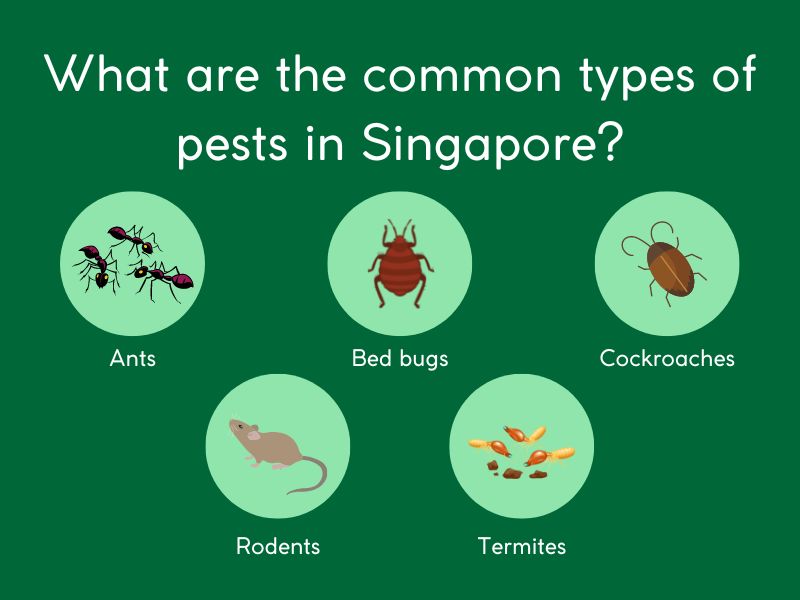
What Are The Common Types Of Pests In Singapore?
Singapore is a popular place for all sorts of pests. The most common types of pests found in Singapore include:
- Ants
- Bed bugs
- Cockroaches
- Rodents
- Termites
Ants will go around your house in search of any remaining food scraps. Bed bugs spend their time in furniture and especially beds. They are active at night and search for human beings to feed on their blood. Cockroaches are happiest in moist and damp environments. They come out in search for food, so you will often find them at night in the kitchen. Rats and mice also go around looking for food. Termites present a whole different challenge. They thrive on eating through wooden structures. If undetected, they can cause a lot of structural damage.
Home and business owners need to be aware of the threats of each type of pest. Take the necessary action to reduce the risk of pest infestations yourself, or contact a professional to take care of an infestation.
Want to find out more about pest removal in Singapore?
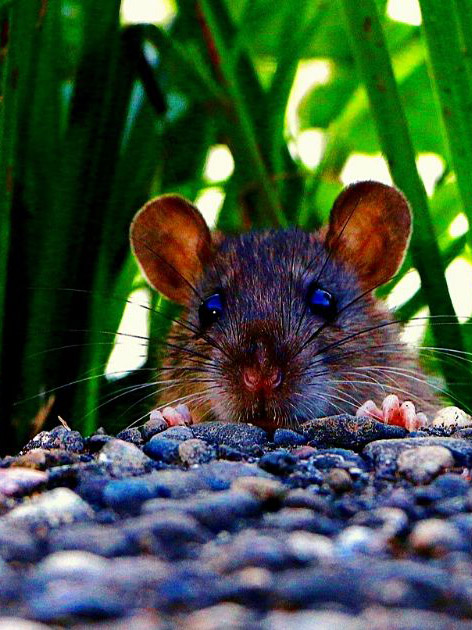
Wet vs. Dry Season
During the wet season, for example, you may find that insects are more of a problem which could increase the chance of you requiring services such as ants, fly or mosquito control. They may want to escape from the downpours outside. Of course, during extremely dry times ants, rodents, and other pests might try to come inside trying to find water to drink. This means that pests of all types tend to be active in the Singapore area throughout the year, and you need to be vigilant if you hope to keep them under control.
There are some things you can do to reduce the “attractiveness” of your property to different types of pests. Make sure that they do not have easy access to food or water, for example. They will not be as likely to want to make your home their new residence if they do not have the things they need to survive. Of course, this is not always easy, and you might find yourself inundated with pests whether it is the wet or dry season. In those cases, you need some help.
We have collected data on the pest management jobs we have carried out over the calendar year to provide you with a guide on when you are more likely to require certain types of pest services during the wet and dry seasons:
| Pest Issue | Season | |
| Dry Season | Wet Season | |
| Ant Removal | Medium Requirement | Medium Requirement |
| Fly Control | Medium Requirement | Medium Requirement |
| Mosquito Control | Medium Requirement | High Requirement |
| Rodent Control | High Requirement | High Requirement |
| Termites Control | Medium Requirement | Medium Requirement |
| Cockroaches Control | High Requirement | High Requirement |
Getting Help for Pest Issues in Singapore
No matter the time of the season, you need to make sure that you have control at your home or business.
Pro Tip: Whether they are rats, cockroaches, fleas, ticks, flies, or any other type of pest, it is vital that you have them removed quickly and efficiently.
This means you should hire a professional service in Singapore. Have the professionals come to your property to kill and remove the pests, and to provide you with tips on how you can keep those pests from returning.
Research the company you are considering and make sure they have the experience and expertise to handle the type of pest problem you have currently so you can keep the property free from infestations of all sorts.

Pest Problem? Let Us Help.
We offer fast and effective precision treatments to eliminate pests while ensuring a safe environment for your home or business.

